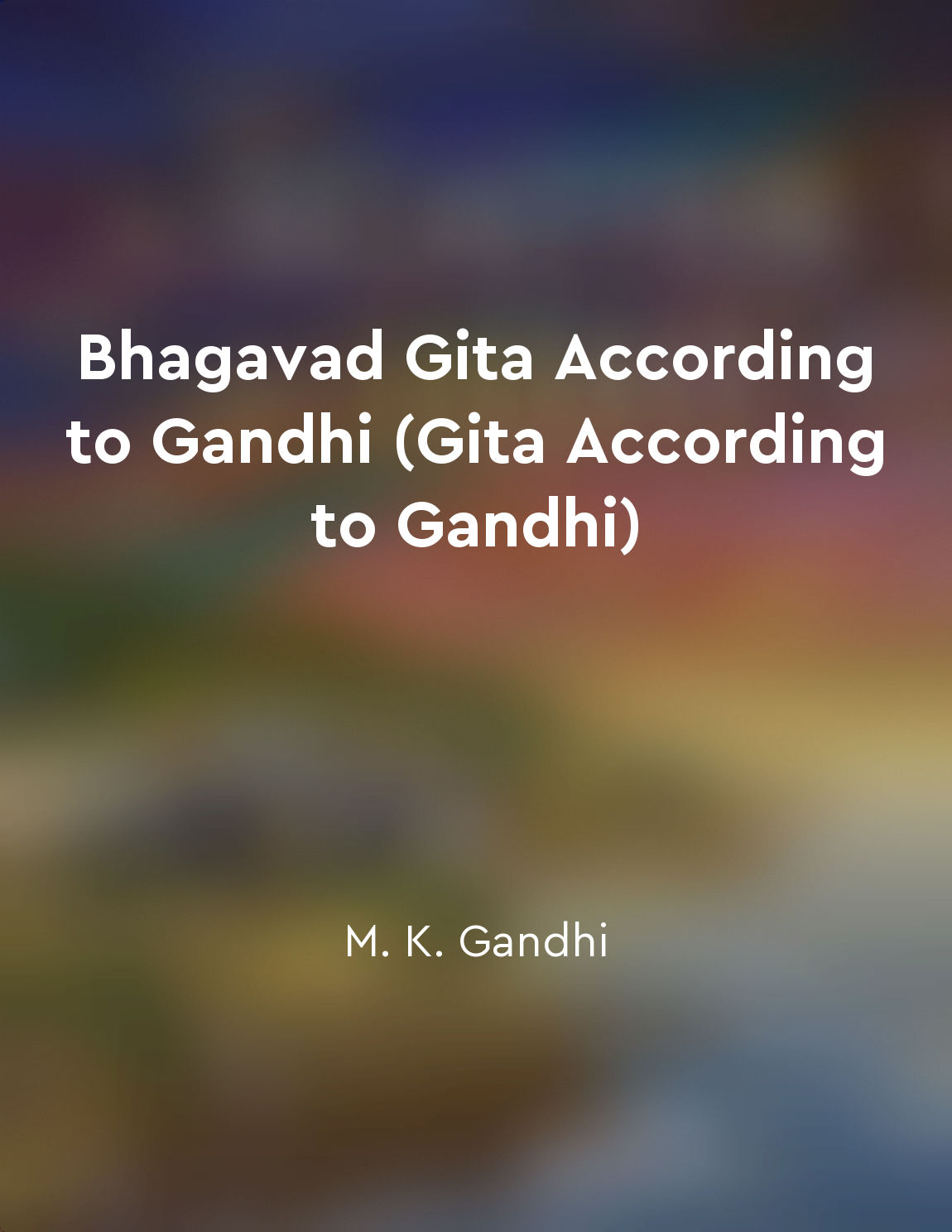Renounce selfish desires from "summary" of Bhagavad Gita According to Gandhi (Gita According to Gandhi) by M. K. Gandhi
The teaching of renouncing selfish desires is central to the Bhagavad Gita. According to this sacred text, selfish desires are the root cause of all suffering and bondage. When one is driven by selfish desires, they are constantly seeking to fulfill their own personal interests without regard for the well-being of others. This selfish mindset leads to greed, attachment, and ego, which ultimately lead to suffering and discontentment. In order to break free from this cycle of suffering, one must renounce selfish desires and instead cultivate selflessness and detachment. By letting go of selfish desires, one is able to transcend the ego and connect with the higher self, which is pure and divine. This shift in consciousness allows one to act from a place of love, compassion, and service towards others, rather than from a place of self-interest. Renouncing selfish desires is not easy, as it requires a deep level of self-awareness and self-discipline. It involves letting go of one's attachments to material possessions, status, and power, and instead focusing on spiritual growth and inner peace. This process of renunciation is a gradual one, requiring constant reflection, practice, and surrender to the divine will. Through renouncing selfish desires, one is able to attain true freedom and liberation. By letting go of the ego and connecting with the higher self, one is able to experience a sense of unity with all beings and with the divine. This state of selflessness and oneness brings about inner peace, joy, and fulfillment, which far surpass the fleeting pleasures of fulfilling selfish desires.- Renouncing selfish desires is a fundamental teaching of the Bhagavad Gita that guides individuals towards spiritual awakening and enlightenment. It is a call to transcend the limited ego-driven self and align with the higher divine self, which is pure, selfless, and infinite. Only through renouncing selfish desires can one experience true happiness, peace, and fulfillment in life.
Similar Posts
Let go of the past to experience the present fully
The past is always with us, burdening us with memories and regrets. It is like a heavy weight that we carry on our shoulders, p...
Essence of true wisdom and knowledge
True wisdom and knowledge, as expounded in the Bhagwat Gita, is not merely the accumulation of facts and information. It goes b...

Embracing the divinity within
The Bhagavad Gita teaches us to recognize and embrace the divinity within ourselves. It emphasizes the idea that each one of us...
The Geeta provides guidance on how to live a meaningful and fulfilling life
The Bhagavad Gita is a timeless spiritual scripture that offers profound wisdom and guidance on how to live a meaningful and fu...
Detachment from the fruits of actions
Detachment from the fruits of actions is a concept that is emphasized throughout the teachings of the Bhagavad Gita. It refers ...

The power of faith and devotion
Faith and devotion are essential elements in the practice of Bhakti-yoga, as explained in the Bhagavad-Gita. When one has faith...
Overcoming fear and doubt
Fear and doubt are powerful emotions that can hinder one's ability to act decisively and with clarity. In the Bhagavad Gita, Ar...
Essence of true wisdom and knowledge
True wisdom and knowledge, as expounded in the Bhagwat Gita, is not merely the accumulation of facts and information. It goes b...
Let go of attachment
Attachment is a concept that binds us to the material world, causing suffering and preventing spiritual growth. When we are att...

Finding ultimate fulfillment in serving God and humanity
In the Bhagavad Gita, Lord Krishna teaches us that the ultimate fulfillment in life comes from serving God and humanity. By ded...


